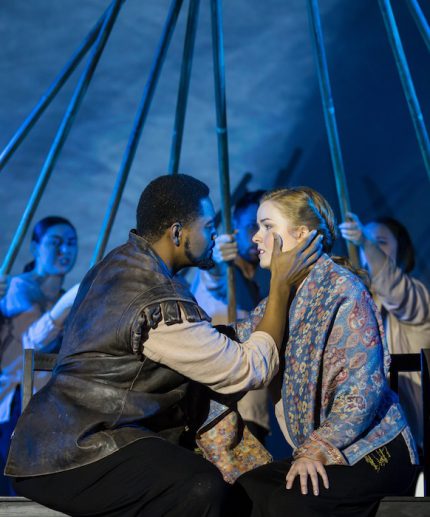Chicago Opera Theater makes a case for Martin’s austere “Le vin herbé”

Chicago Opera Theater is on the move–literally and professionally.
The city’s alternative opera company opened its most ambitious season in years Friday night with Frank Martin’s Le vin herbé–not at COT’s usual downtown venue, the Harris Theater, but at the Music Box Theatre on the north side.
General director Andreas Mitisek was in high spirits before the curtain and with good reason, as it turned out. This production was an unqualified success across the board and a model of what COT does best in the Mitisek era–presenting rarely heard works in convincing, intelligent stagings with cost-effective resources.
Le vin herbé–or The Love Potion in this translated English performance–is an intimate work, scored for small chamber ensemble and 12-voice choir, from which individual singers step out to portray their roles and act as narrators. This is not a traditional opera–Martin called Le vin herbé “a secular oratorio”–and his intimate treatment is light years away from Wagner’s epic saga of the same scenario. Cast in the Swiss composer’s austere style, there are moments of luminous beauty alongside talky, monochromatic stretches that make the work extremely difficult to stage.
As director and production designer, Mitisek brought the story to surprisingly vivid life in a theatrical manner that still respected Martin’s rather ascetic score. The inventive production made a virtue out of scant resources with spare, effective lighting and evocative projections on the large screen of castle ruins, turbulent ocean waves and decayed statues, nicely painting the gloomy Celtic milieu of the doomed lovers. Stage monotony was avoided by having the chorus frequently reposition themselves to act out the narrative, wielding what looked like wooden closet rods, which doubled as oars, spears, bare trees and a cross for the dying Tristan.
The English translation sacrificed a certain Gallic continental quality, but made up for that with dramatic directness. Apart from an extended awkward pause when the chorus and conductor seemed to be waiting for each other–likely a result of some judicious trimming of the score–Mitisek’s direction was fluent and kept the story moving.
Lani Stait was impressive in the role of Isolde. The young soprano displayed a bright, youthful tone with pinpoint clarity and even projection throughout her range, and was always dramatically credible in her understated acting.
As Tristan, Bernard Holcomb’s low-lying tenor is less distinctive, but he sang with both strength and sensitivity. The Ryan Center alum handled the fitful top notes handily, brought dramatic concentration to Tristan’s extended reminiscence of his history with King Mark, and made an affecting fallen hero in the final scenes.
The rest of the ensemble sang robustly and with well-blended cohesion as a unit and took their various solo roles with distinction. Standouts were Nicholas Davis as an authoritative King Mark, Cassidy Smith as Isolde’s mother and Brittany Loewen as Branghien. Young singer Zacharias Niedzwiecki displayed an imposing, rounded bass as Duke Hoel.
Located off to the left of the raised stage platform, Emanuele Andrizzi conducted the chamber octet with alert pacing and well-balanced precision. Violinist Dmitri Pogorelov and pianist Sheldon Miller provided notable contributions.
The Music Box Theatre with its somewhat faded grandeur, made an inviting and congenial home, the 600-seat space more in scale for COT productions than the vast Harris Theater. The movie house acoustic proved superb, with voices and instruments emerging vibrantly with striking clarity and immediacy.
The Love Potion will be repeated 3 p.m. Saturday and October 9 at the Music Box Theatre. cot.org
Posted in Performances

